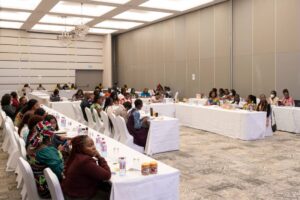Experts have iterated the need for entrepreneurs especially those in the micro, small, and medium-sized enterprises landscape to formalise their businesses to enhance access to funding opportunities.
Chief Executive Officer of Innohub, Nelson Amo, said entrepreneurs must prioritise proper documentation and prove financial viability as it is one of the key factors to demonstrate investor readiness.
“To be investor-ready, we need to start building formal systems and structures. How you keep your books, annual reporting, audited report, audited financials and so on, are things that are essential because if you do not have them, you cannot even start a conversation with any investor be it a bank or venture capital fund.
“MSMEs will complain that is difficult to do but you need that to be able to raise money. If you want to build a business that can scale and be able to attract or unlock external capital then that discipline must be inculcated from the word go,” he told women-owned and women-led businesses at the maiden Investor Marketplace Forum held in Accra.
Reiterating the MSME’s potential to enhance job creation and add value to the economy, he made reservations about how the cost of capital continues to hamper the ecosystem’s competitiveness.
“If you take emerging economies like Ghana, the potential for MSMEs to contribute has been quite restricted and constricted through things like cost of capital. Without capital to scale up, they will be stagnant. So, to release the potential of MSMEs to contribute to job creation and to grow the economy, we need to look at how to free capital to them at a lower cost and build different layers of capital access,” he said.

Head of Women’s Desk at Ecobank, Dr. Loretta Sarpong, recommended that, to simplify financial institutions’ evaluation of MSMEs’ viability, the entrepreneurs must develop a daily practice of recording their cash flow and exploring digital payment channels.
“You must separate your working capital from operational expenses. Have a personal account and use that for your personal expenses, and pay yourself as a business owner. Position yourself to grow and scale, we want mindsets changed and have that drive to grow ” she said.
She also encouraged the entrepreneurs to create business accounts as banks do not give business loans on personal accounts, while urging them to take advantage of the benefit the African Continental Free Trade Area (AfCFTA) presents.
Managing Partner at Alpha & Escamore, Augustina Damete-Yeboah is of the view that businesses must associate or partner with liked-minded ones in the same space to reduce the cost of operations or production.
This, she said, could position them to scale up and meet demands especially when high interest rates are a challenge to many.
The lead of Coverage and International Business at C-Nergy Ghana Limited, Madam Evelyn Sena King also emphasised that entrepreneurs put structures in place to ensure that they build a business that goes beyond them and yields valuable results.

The Investor Marketplace Forum is a stage where ideas transform into actions, where dreams become realities, and networks flourish into fruitful collaborations.
The programme is organised under the auspices of the UK Trade Partnership project, which is being implemented by the International Trade Centre (ITC), a joint agency of the United Nations and the World Trade Organisation in partnership with the Innohub Foundation, to empower and uplift the women entrepreneurs.
It made room for participants to explore a wide array of topics, from access to finance and investment opportunities to innovative business models, sustainable practices, and the latest market trends.
The organisers believe that through collaboration, mentorship, and support, they can foster an environment where women entrepreneurs not only succeed but also lead the way in transforming industries and inspiring the next generation.
The Forum forms part of ITC’s strategy of implementing value chain development projects in Ghana with the objective of improving the competitiveness of farmers and agribusiness MSMEs in the cocoa sector and associated crops with a focus on digitalization.










